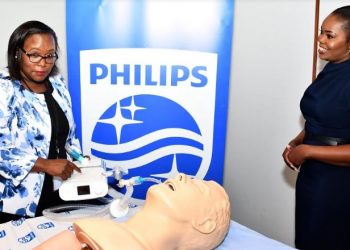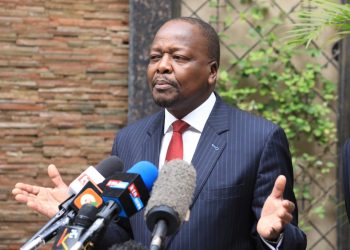By Stephen Macharia
Today, Azibeta Likhaya, 81, does not understand why she cannot embrace, shake hands or get physically close to family members at her home in Roasterman Village, Kakamega County even as Covid-19 infections upsurge in Kenya.
She lives with comorbidities; Dementia a syndrome characterized by a decline in memory, language and ability to perform daily activities; Arthritis which is a chronic disabling condition affecting body joints, muscles plus connective tissues; and Hypertension, an illness that subjects blood vessels to persistently raised pressure.
However, Azibeta’s dementia syndrome is what worries the family as cases of Covid-19 spread across the country.
Oblivious of her susceptibility to contracting Covid-19, Azibeta, now living under stricter confinement measures her family imposed since Kenya recorded the first Covid-19 case in mid-March, currently manifests forms of aggression towards regaining lost reassuring habits: visiting neighbours; greeting people; and freedom from family surveillance.
The family is now in a rattrap when it comes to handling her situation amid rising Covid-19 infections, her son and caregiver Mr. Wyclif Likhaya, admits. “Granting her freedom to move around increases her exposure to Covid-19 but we understand excessive restrictions may end up upsetting her mental well-being.”
Worse still, she cannot wear a facemask for long before throwing it away for making her “feel uncomfortable”.
In Roasterman Village, located four kilometers from Kakamega town, residents live in palpable fear of Covid-19 infections. A section of the village serves as the town dump site where all forms of waste, including used facemasks and medical waste, litter the surface. The dumpsite is less than two kilometers from Azibeta’s home.
Mr. Likhaya, a graduate in Social Work who also serves as a volunteer caregiver for two other neighbours living with chronic illnesses, knows her mum’s condition requires “careful handling”.
Outside the home compound, the family discerns, Azibeta cannot consistently observe Covid-19 preventive measures enforced by the government, setting her up for arrest by authorities.
“Mum keeps asking why people do not show her appreciation by shaking hands these days,” says Mr. Likhaya. “In addition to her old age, her health condition is a fertile ground for severe Covid-19 infections.”
However, there are other concerns: the government has imposed strict measures including dawn to dusk curfew and mandatory 1.5 meters physical distancing between people in public.
But dementia, which manifests with cognitive symptoms such as mental confusion and language alterations, not only exposes Azibeta to the risk of Covid-19 infection but also increases her chances of being arrested for infractions to government directives.
The risk of developing dementia increases with age. According to the World Health Organization (WHO), the syndrome is one of the major causes of disability and dependency among older people worldwide.
“There are many different forms of dementia. Alzheimer’s disease is the most common form and may contribute to 60–70% of cases. Other major forms include vascular dementia, dementia with Lewy bodies (abnormal aggregates of protein that develop inside nerve cells), and a group of diseases that contribute to frontotemporal dementia (degeneration of the frontal lobe of the brain). The boundaries between different forms of dementia are indistinct and mixed forms often co-exist,” WHO says.
According to Dr. Muthoni Gichu, Head of Geriatric Medicine at the Ministry of Health, a majority of people with dementia are older persons “unable to follow the instructions prescribed by the government.”
Dementia, which has no known cure, begins between 30 to 50 years before symptoms show, Dr. Gichu says. About 8% of people aged 60 and above have dementia.
To prevent dementia, or at least delay the age at which it may start, Dr. Gichu, also an Exercise Physiologist, urges Kenyans above the age of 50 go for cognitive screening.
“The test takes about 10 minutes,” she says.
Dr. Gichu says people with dementia require cognitive stimulation therapy (CST) usually provided in social groups of between five to eight people. “But with Covid-19, this is not possible.”
CST sessions are meant to improve the mental abilities and memory of people with dementia and serve as non-pharmaceutical interventions in the management of dementia.
“Common signs of dementia include loss of memory that include forgetting to eat or take a shower,” Dr. Gichu adds.
Globally, 50 million people have dementia, a figure projected to hit 152 million by 2050 according to Alzheimer’s Disease International (ADI), the international federation of associations supporting people with Alzheimer’s and dementia.
The Alzheimer’s & Dementia Organization Kenya (ADOK) estimates over 61,000 people in Kenya have dementia.
ADOK CEO and Founder Elizabeth Mutunga says the Covid-19 preventive measures have taken a toll on the management of Alzheimer’s and other forms of Dementia. ADOK has a membership of over 300 caregivers.

The organization has stopped monthly meetings designed to offer psychological support for caregivers. With the last caregivers meeting held in February, ADOK has resulted to calling caregivers fortnightly for support, Mutunga says.
Through social support to caregivers, ADOK hopes to improve quality of care given to dementia patients.
“Caring for a person with dementia may result in profound impacts on physical and mental health,” Mutunga points out. “We understand some of the caregivers have lost jobs. That puts the wellbeing of the patients and carers at risk of deterioration.”
A 2019 study conducted by ADI found about 75% of carers often stressed between caring and meeting other responsibilities. Over 50% of carers reported declined health because of their caring responsibilities.
Mutunga says boredom can stimulate depressing, aggression and even frustration for people with dementia. “Being stuck in the house for long hours may end up spurring boredom,” she says.
This article was made possible with a Health Reporting Grant funded by the Media Council of Kenya.















